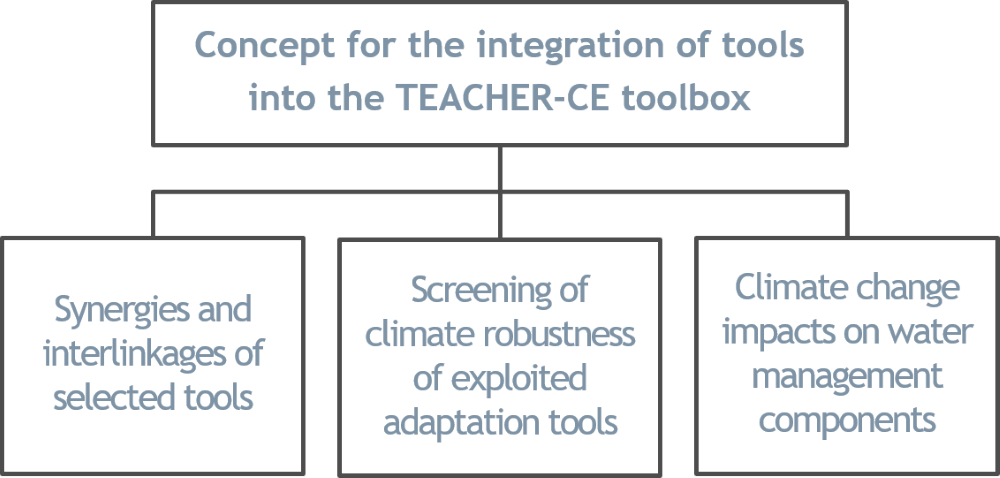EXPLOITATION: INTEGRATION OF TOOLS INTO THE TEACHER-CE TOOLBOX
The goal of the Interreg project “TEACHER-CE” is to develop an integrated Toolbox focusing on a climate-proof management of water related issues. This innovative Toolbox is based on the integration of several tools developed within different previously funded EU projects. The purpose of these tools ranges from guidance documents to intraoperative applications (decision support tools). All relevant tools enable the identification and implementation of measures to make municipalities and regions in Central Europe (CE) more resilient to extreme weather events (including climate change) and avoid negative impacts on ecosystems and land use.
In the first project phase the project partners elaborated a concept for the integration of tools into the TEACHER-CE toolbox. The aim of this concept is to activate synergies between different already established tools in the context of climate adaptation and to tailor the toolbox to the needs of potential users.
The concept for the integration of tools into the TEACHER-CE toolbox was built on three pillars:

Established tools as basis for the concept
A lot of projects developed (transferable) tools for municipalities as well as regional and national authorities to better manage the impacts of climate change and weather extremes like heavy rain, droughts and floods and to make different kinds of land use more sustainable. These projects use different approaches for integration and implementation of their outputs and provided best-practice solutions for different geographical and regional settings.
The starting point for the conception phase was the creation of a common overview of project tools and their interlinkages. In total, 23 projects are evaluated in this process, with a particular focus on the four projects RAINMAN, PROLINE-CE, FRAMWAT and SUSTREE. The aim was to identify synergies between these approaches and thus create a basis for the conception of the TEACHER-CE toolbox. Particular results of the projects will be included in the toolbox and the measures database of the toolbox.
Screening of climate robustness of exploited adaptation tools
In addition to identifying synergies of the projects and tools, the question of whether and how uncertainties regarding climate change scenarios are taken into account in the tools was also investigated. Therefore, a comprehensive assessment regarding the robustness of the tools was conducted, including both conceptual (target contexts, accounted issues, and main focus) and operational aspects (input data, output typology, and data processing support).
Climate change impacts on water management components
Climate change impacts on water management have been addressed in existing studies and projects. A compilation of this knowledge in the partner countries of the TEACHER-CE project was created to add additional value to the understanding of stakeholder needs. The comprehensive analysis of “Climate change impacts on water management components” consists of a quantitative and a qualitative approach.
The quantitative oriented part provides a general overview of expected climate change and its potential impacts in Central Europe, with a focus on the Pilot Actions of the project. The definition of the current climate conditions, as well as the evaluation of the future variations of a number of weather/climate-related variables, are supported by the availability of high-resolution climate models that allow obtaining assessment for both recent decades and future periods.
The second part evaluates and structures the main climate change impacts on water management activities and related adaptation options in the different fields of action as entry point for the toolbox. To create a basis for the conception of the TEACHER-CE toolbox, the wide range of facts and findings was filtered and a focus was set. Those climate change impacts were evaluated and documented that may play an important role in the context of the TEACHER-CE-project.
Toolbox concept for integration of tools
The main outcome of the three pillars of WPT1 is a concept for the integration of exploited tools that activates synergies between different tools and meets the needs of users in the context of climate change. The concept includes for example a description of the vision of the toolbox, its target group and the technical outline of the toolbox.
Based on the selected four projects that are “capitalized” in the TEACHER-CE project, this toolbox will especially support users to:
- manage the effects of heavy rainfall and floods;
- exploit small water retention measures
- protect drinking water through sustainable land use
- and properly manage forests under climate change
